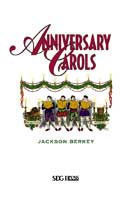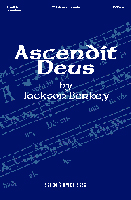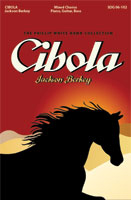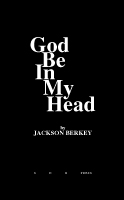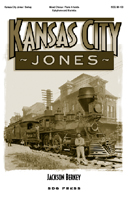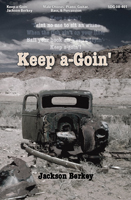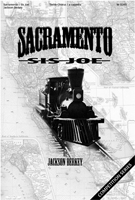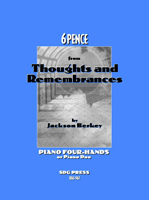SDG 98-203 Handbell Ensemble (Arr. Robert Noland)$ 3.95SDG 91-101 Mixed Chorus$ 1.25 SDG 12-401 Male Chorus$ 1.25
(Anniversary Carols)Chorus a cappella or Handbell Ensemble2'SDG 98-203 Handbell Ensemble (Arr. Robert Noland)$ 3.95SDG 91-101 Mixed Chorus$ 1.25 SDG 12-401 Male Chorus$ 1.25Angels We Have Heard on High is one of America's most beloved carols. It comes to us from the French countryside where it emerged anonymously as a "macaronic" carol (that is, with its text a mlange of Latin and vernacular French,) probably in the 1700s, called Les angel dans nos campagnes. Jackson Berkey's arrangement is strikingly individual, with its particular non-strophic handling of the text.See also Angels We Have Heard On High for Handbells (SDG 98-203).
Chorus a cappella3.5' SDG 96-102 Male Chorus$ 1.50SDG 96-103 Treble Chorus$ 1.50SDG 96-104 Mixed Chorus$ 1.70Ascendit Deus, in its original TTBB voicing, is the second commissioned work written for Gary Schwartzhoff and the Singing Statesmen, University of Wisconsin~Eau Claire. The work opens with the original Gregorian chant transliterated from the Liber Usualis and progresses tonally and rhythmically into a Twentieth Century Alleluia which reaches a powerfully climactic vocal peak. Ascendit Deus was also set for SATB chorus (for Almeda Berkey and Soli Deo Gloria Cantorum) and for SSAA treble voices (for Jerome Wright's Seattle Girls' Choir).
See also Gregorian Tangent for Cello Ensemble (SDG 07-204).
(The Phillip Whitehawk Collection)Chorus, Piano, Guitar, Bass (opt.)4' SDG 06-102 Mixed Chorus$ 4.75 SDG 06-402 Male Chorus$ 3.80 Cello EnsembleBerkey's setting of Cibola masterfully captures the essence of Native American Phillip White Hawk's style from a very masculine and dynamic vocal timbre to a falsetto. Commissioned for the 2006 Songfest Men's Choral Conference at the University of Illinois-Urbana, Dr. Barrington Coleman, Conductor, it is successfully performed with piano alone, or with added bass and a single acoustic guitar or larger guitar ensemble. Exciting to sing!See also Spanish Gold for Cello Ensemble, Piano, Guitars (SDG 07-207).
Chorus a cappella3.5'SDG 93-104 Male Chorus$ 1.40SDG 93-105 Treble Chorus$ 1.40 SDG 93-106 Mixed Chorus$ 1.40God Be In My Head was commissioned by Gary Schwartzhoff and the Singing Statesmen at the University of Wisconsin-Eau Claire. It is structured around original chant-like melodic fragments which are hinted at in the optional "celebrant" solo at the start of the piece and then fully stated in the first three ad libitum measures. With the melody throughout, the expressive setting exploits the dynamic and vocal ranges of the chorus while exploring both mixtures and combinations of tertian and quartal harmonic structures.
See also Sarum Primer 1545 for Cello Ensemble (SDG 07-203).
(Thoughts and Remembrances, Carnegie Hall Series)Chorus, Organ, Piano, Harp3.2' SDG 96-108 Mixed Chorus$ 1.50SDG 96-109 Treble Chorus$ 1.50SDG 96-110 Male Chorus$ 1.50Isaiah 44:3 expresses a beautiful promise from God to His people. An ancient text set to a chant-like melody by the composer hearkens back to the sound of Hebrew melody. Beginning from barely audible sounds, the choral dynamics progress fully as the work unfolds. The repetition of the chant develops both through extensions in the voice parts as well as in the accompaniment. While the melody remains constant throughout, harmonic extensions occur in the underlying parts. The work seems to develop roots almost figuratively as the promise of God takes root and nourishes generation after generation of His people's seed upon the earth. The SATB version was performed in the Carnegie Hall Series. Isaiah 44:3 is also available in a setting for solo harp.
The Wisdom of Isaiah SDGS 971 (Nature of the World)
(Anniversary Carols)Chorus a cappella2.5'SDG 94-103 Mixed Chorus$ 1.35 SDG 03-403 Male ChorusJoy to the World is a Christmas hymn familiar to all of us in spite of its somewhat confusing history. With importance of text constantly in mind, this setting makes use of Isaac Watts' words and the tune usually known as Antioch. In this arrangement, the third verse words appear at the outset in a modal treatment which is fast overcome by 20th Century rhythms and a polymetric combination of ostinato and hymn tune. Word painting occurs as we "repeat the sounding joy," but the "wonders of His Love" eventually surface triumphant.
Chorus, Piano 4-hands, Train Whistle, opt. Marimba/Xylophone5' SDG 98-103 Mixed Chorus$ 2.00SDG 98-401 Male Chorus$ 2.00SDG 99-303 Treble Chorus$ 2.00SDG 98-103P Marimba, Xylophone parts$ 5.00The tune Casey Jones (alias K.C.) takes place amidst train whistles and a dramatic spoken history, with a train in the choir! This song is great fun to sing and exciting to hear.
Chorus, Piano, Guitar, Bass & Percussion4' SDG 08-401 Male Chorus$ 3.95SDG 08-401P Guitar, Bass, Percussion parts$ 10.00Containing a certain charm and optimism in the midst of sometimes dire circumstances, Frank Stanton's lyrics touch readers in all walks of life. Commissioned by the Langham Family in honor of William P. Langham's 75th birthday and his 18 years of singing with the Naperville (IL) Men's Glee Club, both choral settings can be performed successfully with piano alone or with the additional instrumental parts.
Chorus a cappella6'SDG 02-401 Male Chorus$ 1.50 SDG 03-305 Treble Chorus$ 1.50Varied tempi and notation styles relative to an eclectic mix of historic periods define this work. On suggestion from the commissioning body, the text (Luke 2:29-32), is presented in both Latin and English. Commissioned by The Singing Statesmen, University of Wisconsin - Eau Claire, Dr. Gary Schwartzhoff, Conductor.
See also Lumen for Cello Ensemble (SDG 07-206).
(Anniversary Carols)Chorus a cappella, opt. Tambour, Finger cymbals3'SDG 91-102 Mixed Chorus$ 1.25SDG 03-404 Male ChorusSDG 99-100P Harp, Bass, Percussion Parts (Order complete set)$ 25.00O Come, All Ye Faithful is probably the most popular Christmas hymn (as distinguished from carol) in America. Although its origins remained obscure for more than two centuries, this originally Latin hymn, Adeste fideles, can now be attributed with certainty to John Francis Wade (1711-1786), a teacher of music who specialized in copying plainchant for use in chapels and homes of prominent families in France. It was translated into English by the Rev. Frederick Oakley in 1842 and was first printed in Murray's Hymnal in 1852 in England. Jackson Berkey has a lively arrangement, with a striking treatment of the refrain.
(American Journey, Carnegie Hall Series)Chorus, Piano 4-hands, opt. Marimba/Xylophone5'SDG 96-105 Mixed Chorus$ 2.95SDG 96-106 Male Chorus$ 2.95W 5040 Chorus (Walton Music)SDG 96-107 Treble Chorus$ 2.95SDG 96-567 Marimba, Xylophone mallet parts$ 5.00Sacramento~Sis Joe was commissioned by Dr. Charles Smith for the Hastings (NE) College Concert Choir tour to Japan in March of 1996. The work is a joyous, eclectic mix of Americana at its best! It is a combination of Camptown Races (with text about the Sacramento gold rush) and Sis Joe, a railroad work song used by Aaron Copland in his Rodeo! With the addition of a dance section, piano 4-hands, and mallet instruments, it makes a tremendous concert closer! SATB setting also found in American Journey, Carnegie Hall Series.
(Thoughts and Remembrances, Carnegie Hall Series)Chorus, Piano 4-Hands2' SDG 96-113 Mixed Chorus$ 1.50SDGS 967 Piano 4-hands$ 4.50SDG 96-114 Treble Chorus$ 1.50SDG 96-115 Male Chorus$ 1.50 SDG 96-113 Mixed Chorus$ 1.50The English rhyme Sing a Song of Six Pence, is the basis for 6Pence. Following a robust statement of the familiar melody by all the voices, the tune continues while the background begins "counting money, eating bread and honey, counting bread," (as in "money")! This leads to the "Counting and Eating" instrumental solo which includes excerpts from Mozart's Overture to The Marriage of Figaro and a Berkey frenzy on the piano. During this extravaganza, the women eat bread and honey while the men count their money. The piece concludes with the voices reiterating the overture to Mozart's opera, taking them to a high "C" and finishing with uproarious laughter and applause. The work bears the dedication: "For my mother, Josephine, in celebration of her ever-present, always irreverent sense of humor!" SATB version was performed in the Carnegie Hall Series.
(Anniversary Carols)Chorus and Harp or Keyboard6'WW 1255 Mixed Chorus, Mezzo-Soprano Solo (Walton Music)W 5035 Treble Chorus, Mezzo-Soprano SoloW 9005 Male Chorus, Baritone SoloSDG 99-100P Harp, Bass, Percussion Parts (Order complete set)$ 25.00Still, Still Night (Silent Night) is a carol known the world over. Its music by Franz Gruber and text by Joseph Mohr have been translated into virtually every language where Christmas is celebrated. As an expression of love and thanks, this setting intentionally emulates, in key and feeling, the wonderful arrangement of Still, Still, Still by the composer's mentor, Norman Luboff. The arrangement bears a dedication to Norman and his wife, Gunilla. Contact HalLeonard.com to order.
See also Silver Winds in the Night for Flute Orchestra (SDG 01-600).
